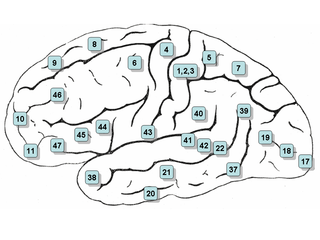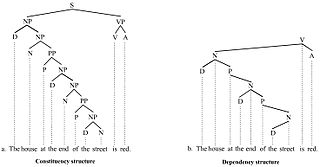Related Research Articles
In linguistics, syntax is the study of how words and morphemes combine to form larger units such as phrases and sentences. Central concerns of syntax include word order, grammatical relations, hierarchical sentence structure (constituency), agreement, the nature of crosslinguistic variation, and the relationship between form and meaning (semantics). Diverse approaches, such as generative grammar and functional grammar, offer unique perspectives on syntax, reflecting its complexity and centrality to understanding human language.
Psycholinguistics or psychology of language is the study of the interrelation between linguistic factors and psychological aspects. The discipline is mainly concerned with the mechanisms by which language is processed and represented in the mind and brain; that is, the psychological and neurobiological factors that enable humans to acquire, use, comprehend, and produce language.

Neurolinguistics is the study of neural mechanisms in the human brain that control the comprehension, production, and acquisition of language. As an interdisciplinary field, neurolinguistics draws methods and theories from fields such as neuroscience, linguistics, cognitive science, communication disorders and neuropsychology. Researchers are drawn to the field from a variety of backgrounds, bringing along a variety of experimental techniques as well as widely varying theoretical perspectives. Much work in neurolinguistics is informed by models in psycholinguistics and theoretical linguistics, and is focused on investigating how the brain can implement the processes that theoretical and psycholinguistics propose are necessary in producing and comprehending language. Neurolinguists study the physiological mechanisms by which the brain processes information related to language, and evaluate linguistic and psycholinguistic theories, using aphasiology, brain imaging, electrophysiology, and computer modeling.
Parsing, syntax analysis, or syntactic analysis is a process of analyzing a string of symbols, either in natural language, computer languages or data structures, conforming to the rules of a formal grammar by breaking it into parts. The term parsing comes from Latin pars (orationis), meaning part.
In generative grammar and related frameworks, a node in a parse tree c-commands its sister node and all of its sister's descendants. In these frameworks, c-command plays a central role in defining and constraining operations such as syntactic movement, binding, and scope. Tanya Reinhart introduced c-command in 1976 as a key component of her theory of anaphora. The term is short for "constituent command".

Barbara Hall Partee is a Distinguished University Professor Emerita of Linguistics and Philosophy at the University of Massachusetts Amherst (UMass). She is known as a pioneer in the field of formal semantics.

In linguistics, a treebank is a parsed text corpus that annotates syntactic or semantic sentence structure. The construction of parsed corpora in the early 1990s revolutionized computational linguistics, which benefitted from large-scale empirical data.

In linguistics, 'Verb phrase ellipsis' is a type of grammatical omission where a verb phrase is left out (elided) but its meaning can still be inferred from context. For example, "She will sell sea shells, and he will <sell sea shells> too" is understood as "She will sell sea shells, and he will sell sea shells too". VP ellipsis is well-studied, particularly in English, where auxiliary verbs play a crucial role in recovering the omitted verb phrase. The reliance on auxiliary verbs gives English a distinctive mechanism for VP ellipsis, making it one of the most researched languages in this area. VP ellipsis can occur partially or as a whole verb phrase. For instance, Japanese employs a phenomenon known as verb-stranding VP ellipsis, where the verb remains while the rest of the phrase is elided. This cross-linguistic perspective reveals that VP ellipsis is not unique to English, but varies in its structural realization across languages.
Angelika Kratzer is a professor emerita of linguistics in the Department of Linguistics at the University of Massachusetts Amherst.
Sentence processing takes place whenever a reader or listener processes a language utterance, either in isolation or in the context of a conversation or a text. Many studies of the human language comprehension process have focused on reading of single utterances (sentences) without context. Extensive research has shown that language comprehension is affected by context preceding a given utterance as well as many other factors.
In linguistics, grammaticality is determined by the conformity to language usage as derived by the grammar of a particular speech variety. The notion of grammaticality rose alongside the theory of generative grammar, the goal of which is to formulate rules that define well-formed, grammatical sentences. These rules of grammaticality also provide explanations of ill-formed, ungrammatical sentences.

Janet Dean Fodor was distinguished professor emerita of linguistics at the Graduate Center of the City University of New York. Her primary field was psycholinguistics, and her research interests included human sentence processing, prosody, learnability theory and L1 (first-language) acquisition.
Sandra (Sandy) Chung is an American linguist and distinguished professor emerita at the Department of Linguistics at the University of California, Santa Cruz. Her research focuses on Austronesian languages and syntax.
Elisabet Britt Engdahl is a Swedish linguist and professor emerita of Swedish at the University of Gothenburg. She was the first linguist to investigate parasitic gaps in detail.
Margaret "Peggy" Speas is a linguist who works on syntax, specifically evidentiality and Navajo. She is a Professor of Linguistics at the University of Massachusetts Amherst. Speas received her PhD in Linguistics from the Massachusetts Institute of Technology in 1986. Speas's work focuses on differences between elicitation, documentation and linguistic data analysis on North American Native Languages. She also works with preservation of Navajo and is a founding member of the Navajo Language Academy.
Elisabeth O. Selkirk is a theoretical linguist specializing in phonological theory and the syntax-phonology interface. She is currently a professor emerita in the Department of Linguistics at the University of Massachusetts, Amherst.
Dr. Lisa Green is a linguist specializing in syntax and African American English (AAE). She is a professor in the Department of Linguistics at the University of Massachusetts, Amherst. In July 2020 she was awarded the title of Distinguished Professor.
Maria Fernanda Ferreira is a cognitive psychologist known for empirical investigations in psycholinguistics and language processing. Ferreira is Professor of Psychology at University of California, Davis.
Suzanne Flynn is an American linguist and Professor of Linguistics at MIT who has contributed to the fields of second and third language acquisition. She has also investigated language disorders.
Ana Arregui is a linguist and professor in the Department of Linguistics at the University of Massachusetts Amherst. Her research in formal semantics addresses phenomena including modality, tense, aspect, pronouns and indefinites.
References
- ↑ "Lyn Frazier : Department of Linguistics : UMass Amherst". www.umass.edu. Retrieved 2023-05-24.
- ↑ FRAZIER, LYN (1979). ON COMPREHENDING SENTENCES: SYNTACTIC PARSING STRATEGIES (Thesis). ProQuest 302925499.[ non-primary source needed ]
- ↑ "Lyn Frazier - Google Scholar citations". scholar.google.se. Retrieved 2019-02-27.
- ↑ "Lyn Frazier gets Distinguished Graduate Mentor Award". April 21, 2014. Retrieved March 28, 2015.
- ↑ "Lyn Frazier honored at Faculty Convocation". August 31, 2014. Retrieved March 28, 2015.
- ↑ "LSA Fellows By Name | Linguistic Society of America". www.linguisticsociety.org. Retrieved 2023-05-24.
- ↑ Carlson, Katy; Charles, Clifton; Fodor, Janet Dean; Frazier, Lyn, eds. (2019). Grammatical approaches to language processing: essays in honor of Lyn Frazier. Studies in theoretical psycholinguistics. Cham: Springer. ISBN 978-3-030-01563-3.
- ↑ "Studies in Theoretical Psycholinguistics". Springer. Retrieved 2023-05-24.